Related Research Articles
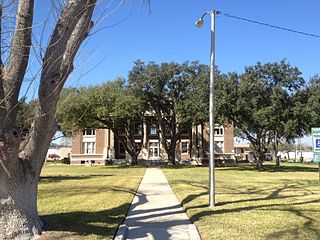
Brooks County is a county in Texas, and Falfurrias is its county seat. Its population was 7,076, about 88% Latino per the 2020 census. It is one of Texas's poorest counties.

The United States Border Patrol (USBP) is a federal law enforcement agency under the United States Customs and Border Protection (CBP) and is responsible for securing the borders of the United States. According to its web site in 2022, its mission is to "Protect the American people, safeguard our borders, and enhance the nation’s economic prosperity."

The United States border with Mexico is one of the world's "most lethal land borders". Hundreds of migrants die per year as they attempt to cross into the United States from Mexico illegally. The US Border Patrol reported 251 migrant deaths in the fiscal year 2015, which was lower than any year during the period 2000–2014, and reported 247 migrant deaths in fiscal year 2020, lower than any year since 1998. Poverty, gang violence, poor governance, etc. are the main factors as to why migrants cross the US border. US Border Patrol recorded 557 southwest border deaths during fiscal year 2021 and 748 in the first 11 months of fiscal year 2022, the most deaths ever recorded.

The Barry M. Goldwater Air Force Range or Barry M. Goldwater Range (BMGR), formerly known as Luke Air Force Range, is a bombing range in the U.S. state of Arizona, between the Mexico–United States border and Interstate 8 straddling the Cabeza Prieta National Wildlife Refuge and the Tohono Oʼodham Nation.
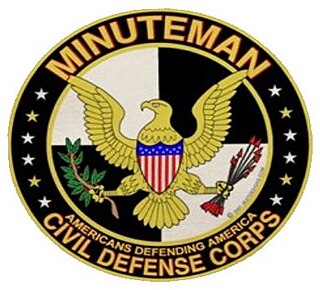
The Minuteman Civil Defense Corps was a volunteer group at one time headed by Chris Simcox and dedicated to preventing illegal crossings of the United States border with Mexico. Arguing that the government was insufficiently concerned with securing the border, they organized several state chapters, with the intention of providing law enforcement agencies with evidence of immigration law violations. The group was one of several that emerged for the proliferation of civilian border patrol groups at the US-Mexico border. Arguably, the emergence of these groups can be linked to the increasing criminalization and securitization of immigration. Simcox stated that the group merely reported incidents to law enforcement, and did not directly confront immigrants. There was a standard operating procedure (SOP) that was to be followed by Minutemen volunteers, with rules including not speaking to, approaching, gesturing towards or having physical contact in any way with any suspected border crossers. According to Anthony Ramirez of the New York Times, the organization "has been criticized as being a right-wing militia".

The Mexico–United States border is an international border separating Mexico and the United States, extending from the Pacific Ocean in the west to the Gulf of Mexico in the east. The border traverses a variety of terrains, ranging from urban areas to deserts. The Mexico–U.S. border is the most frequently crossed border in the world with approximately 350 million documented crossings annually. It is the tenth-longest border between two countries in the world.

Arivaca is an unincorporated community in Pima County, Arizona, United States. It is located 11 miles (18 km) north of the Mexican border and 35 miles (56 km) northwest of the port of entry at Nogales. The European-American history of the area dates back at least to 1695, although the community was not founded until 1878. Arivaca has the ZIP code 85601. The 85601 ZIP Code Tabulation Area had a population of 909 at the 2000 census.

Foreign nationals (aliens) can violate US immigration laws by entering the United States unlawfully or lawfully entering but then remaining after the expiration of their visas, parole, TPS, etc. Illegal immigration has been a matter of intense debate in the United States since the 1980s.
Ranch Rescue was a volunteer organization that claimed to assist American ranchers and other owners of property near the United States-Mexico border in the protection of their property. The organization claimed that the protection was necessary due to 88 by unauthorized border crossers, who it called terrorists. It also claimed that the federal government has willfully and intentionally failed to protect property owners.
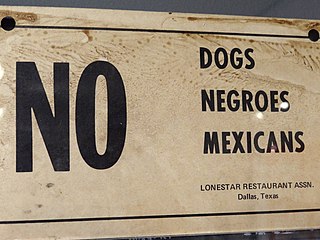
Anti-Mexican sentiment, is prejudice, fear, or hatred towards Mexico and people of Mexican descent, Mexican culture and/or Mexican Spanish and it is most commonly found in the United States.
The Undocumented is a 90-minute documentary film, released in 2013, directed by Marco Williams, which investigates the causes and effects of migrant deaths along the Arizona-Mexico border.
Border Angels is a San Diego-based 501(c)(3) tax-exempt nonprofit charitable organization that is focused on migrant rights, immigration reform, and the prevention of immigrant deaths along the border. Border Angels, along with its more than 2000 volunteers serves San Diego County's immigrant population through various migrant outreach programs such as day laborer outreach and legal assistance, and provides life-saving assistance for migrants by placing bottled water in remote mountain and desert border regions of the San Diego and Imperial counties, California.

Arizona Border Recon (AZBR) is an American paramilitary militia group in Arizona composed of former military, law enforcement and private security contractors.
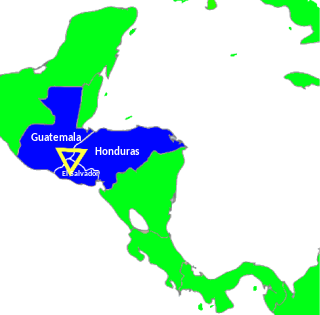
Central American migrant caravans, also known as the Viacrucis del migrante, are migrant caravans that travel from Central America to the Mexico–United States border. The largest and best known of these were organized by Pueblo Sin Fronteras that set off during Holy Week in early 2017 and 2018 from the Northern Triangle of Central America (NTCA), but such caravans of migrants began arriving several years earlier, and other unrelated caravans continued to arrive into late 2018.

Water Station is a charitable organization, founded in 2001, that places water in remote locations throughout the Southern California desert where undocumented migrants are known to cross, in order to mitigate deaths that occur due to extreme heat exposure. It started as a project by John Hunter, a San Diego resident, to place water jugs and flags in the deserts around El Centro, California. The project later expanded to include additional volunteers maintaining hundreds of water stations. By 2013 KPBS described the organization as "the largest, most organized and most consistent group leaving water for migrants in California's brutal Imperial Valley". The charity operates primarily from April to October, and has permission from the Bureau of Land Management to place water and flags on public land.
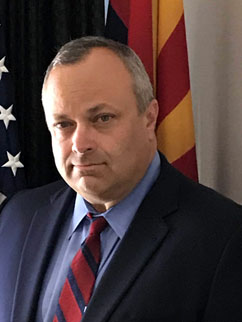
Michael G. Bailey is an American attorney from Arizona. He formerly served as the United States Attorney for the District of Arizona.
Prevention Through Deterrence is a set of policies instituted by the United States to deter the illegal crossing of its southern border with Mexico. First introduced in a document entitled "Border Patrol Strategic Plan of 1994 and Beyond", this policy has since been used to police high-traffic areas of the Mexico–United States border.

Hostile Terrain 94 (HT94) is a participatory art project created and organized by the Undocumented Migration Project (UMP). The exhibition is composed of approximately 3,400 handwritten toe tags that represent migrants who have died trying to cross the Sonoran Desert of Arizona between the mid-1990s and 2021. The tags are geolocated on a large wall map of the Arizona/Mexico border, showing the exact locations where human remains were found. This DIY installation is taking place at over 120 institutions––in the U.S. and abroad––with the intention to raise awareness about the humanitarian crisis at America's southern border and to engage with communities around the world in conversations about migration.
Borderland is a limited-run 2014 television documentary series, produced by Australian production company In Films. It was the first original commission for Al Jazeera America's documentary unit, premiering on 13 April 2014. The series followed six Americans as they retraced the fatal journey of three undocumented migrants who died attempting to cross into the United States.
Missing in Brooks County is a 2020 feature-length documentary, directed and filmed by Lisa Molomot and Jeff Bemiss. Its subject is the passage of illegal migrants through Brooks County, Texas, and specifically how thousands die of dehydration and exposure hiking some 35 miles (56 km) across open fields in 100 °F (38 °C) heat, to avoid the Border Patrol internal checkpoint near Falfurrias, Texas. The ground is sandy and taxing to walk in, and lack of landmarks makes it easy for migrants to get lost and go in circles. Brooks County leads the nation in migrant deaths; most bodies are never found, and most of those found are never identified. The county sheriff calls the county "the biggest cemetery in the United States". News stories have called it "migrants' Death Valley."
References
- ↑ "No More Deaths Homepage". Archived from the original on April 3, 2007. Retrieved March 22, 2007.
- ↑ "A Humanitarian Crisis at the Border: New Estimates of Deaths Among Unauthorized Immigrants" (PDF). Archived from the original (PDF) on April 23, 2013. Retrieved March 24, 2010.
- ↑ Kuruvilla, Carol (August 6, 2018). "Volunteers Say They're Being Targeted For Leaving Water To Help Migrants". HuffPost. Retrieved June 12, 2019.
- ↑ "History and Mission of No More Deaths". Archived from the original on June 11, 2010. Retrieved March 24, 2010.
- ↑ "Mexico will let Tucson-based groups offer aid to migrants south of border". Archived from the original on April 27, 2007. Retrieved March 22, 2007.
- ↑ "Abuse Documentation and Custody Standards". Archived from the original on June 11, 2010. Retrieved March 24, 2010.
- ↑ "Background on Prosecution of Daniel Strauss and Shanti Sellz". Archived from the original on August 31, 2006. Retrieved March 22, 2007.
- ↑ "2 arrested for aiding migrants cleared". Archived from the original on February 5, 2013. Retrieved March 22, 2007.
- ↑ "Episcopal bishop joins migrant-aid prosecution protest". Archived from the original on February 14, 2007. Retrieved March 22, 2007.
- ↑ "Immigrant Rights Victory in Arizona". Archived from the original on July 16, 2011. Retrieved March 24, 2010.
- ↑ The 2007 Oscar Romero Award Archived 2007-04-29 at the Wayback Machine
- ↑ Williams, Carol J. (September 3, 2010). "Border activist's littering conviction is overturned". Los Angeles Times. Archived from the original on November 7, 2014. Retrieved October 15, 2014.
- ↑ "UNITED STATES OF AMERICA v. DANIEL J. MILLIS" (PDF). United States Court of Appeals for the Ninth Circuit . Archived (PDF) from the original on October 11, 2010.
- ↑ "As Caravan Of Migrants Heads North, Trump Threatens To Close Southern U.S. Border". NPR. Archived from the original on 22 October 2018. Retrieved 23 October 2018.
- ↑ "Volunteer arrested after giving food, water to undocumented immigrants". NBC News. Archived from the original on March 18, 2018. Retrieved March 17, 2018.
- ↑ Quinn, Carrot (January 26, 2018). "Why was this man arrested for giving water to migrants crossing the border?". The Guardian. Archived from the original on March 18, 2018. Retrieved March 17, 2018.
- 1 2 Prendergast, Curt (June 12, 2019). "Jury deadlocks 8-4 for acquittal in trial of border-aid worker Scott Warren". Arizona Daily Star. Retrieved June 13, 2019.
- ↑ Karas, Tania (June 6, 2019). "Crimes of compassion: US follows Europe's lead in prosecuting those who help migrants". Public Radio International. Retrieved June 7, 2019.
- ↑ "Disappeared: How US Border Enforcement Agencies Are Fueling a Missing Persons Crisis". The Disappeared Report. Archived from the original on March 17, 2018. Retrieved March 17, 2018.
- ↑ Shuham, Matt (June 12, 2019). "Mistrial For Border Volunteer Charged With Felonies For Aiding Migrants". Talking Points Memo .
- ↑ "ASU Law School Helps Journalist Gain Access To Scott Warren Trial Documents". KJZZ. September 10, 2019. Retrieved September 11, 2019.
- ↑ "Activist arrested for giving migrants food and shelter faces retrial". The Guardian. July 2, 2019.
- ↑ "Second trial against activist who helped migrants to begin". Associated Press. November 15, 2019. Retrieved 2019-11-16– via Hartford Courant.
- ↑ Ingram, Paul (November 14, 2019). "Prosecution rests, defense begins in 3rd day of re-trial of Scott Warren". TucsonSentinel.com. Retrieved 2019-11-16.
- ↑ Stewart, Savannah (November 20, 2019). "Former ASU faculty associate Scott Warren not guilty in harboring trial". The State Press . Retrieved November 21, 2019.